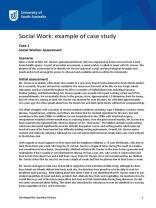Why do we need Code of ethics in social work?
The Code of Ethics in social work is a set of guidelines and principles that outline the professional standards and conduct expected of social workers. It serves as a critical framework for ethical decision-making and behavior within the social work profession. Here are several reasons highlighting the importance of a Code of Ethics in social work:
Client Protection:
- The primary purpose of the Code of Ethics is to safeguard the well-being and rights of clients. It establishes a foundation for ethical and responsible practice, ensuring that social workers prioritize the interests and needs of their clients.
Professional Accountability:
- The Code of Ethics sets clear expectations for professional behavior, promoting accountability among social workers. It outlines the standards and responsibilities that professionals are expected to adhere to, fostering a sense of responsibility for one's actions.
Maintaining Trust and Credibility:
- A strong Code of Ethics contributes to the credibility of the social work profession. Clients, colleagues, and the broader community can trust that social workers are committed to ethical practice, integrity, and the highest standards of professionalism.
Guidance in Ethical Decision-Making:
- Social workers often encounter complex ethical dilemmas in their practice. The Code of Ethics provides a framework to guide practitioners in making ethical decisions. It offers principles and standards that help social workers navigate challenging situations while upholding their professional obligations.
Promoting Social Justice:
- The Code of Ethics underscores the commitment of social workers to social justice and advocacy. It encourages professionals to address systemic issues, promote equal access to resources, and challenge discriminatory practices that impact vulnerable populations.
Professional Identity and Values:
- The Code of Ethics plays a crucial role in shaping the professional identity of social workers. It reflects the core values of the profession, including service, dignity and worth of the person, social justice, integrity, and competence. Adherence to the Code helps define and strengthen the identity of social workers.
Legal Compliance:
- The Code of Ethics often aligns with legal requirements governing social work practice. Social workers must be aware of and comply with both ethical standards and legal regulations to ensure lawful and responsible practice.
Education and Training:
- The Code of Ethics serves as a foundation for education and training in social work. It provides a framework for teaching ethical principles and preparing future professionals for the ethical challenges they may encounter in their careers.
Peer and Professional Relationships:
- The Code of Ethics promotes positive relationships among social workers. It encourages respectful and collaborative interactions, fostering a supportive professional community. Social workers are expected to treat colleagues with integrity and fairness.
Continuous Improvement:
- The Code of Ethics emphasizes the importance of ongoing professional development and self-reflection. Social workers are encouraged to engage in continuous learning and improvement to enhance their skills and stay abreast of evolving ethical standards and best practices.
In summary, the Code of Ethics in social work is a fundamental tool that upholds the values of the profession, protects clients, guides ethical decision-making, and contributes to the overall integrity and credibility of social work practice. It serves as a cornerstone for ethical conduct and helps shape a profession committed to promoting the well-being of individuals, families, and communities.
The Role and Importance of Ethical Codes in the Field of Social Work
Ethical codes play a crucial role in social work, serving as the foundation for professional conduct and decision-making. These codes outline core values, principles, and standards that guide social workers in their interactions with clients, colleagues, and communities. Their importance stems from several key functions:
Promoting Trust and Ethical Practice:Ethical codes establish clear expectations for professional behavior, fostering trust between social workers and the individuals and communities they serve. This trust is essential for building strong relationships and effectively addressing social problems.
Safeguarding Clients and Ensuring Professional Responsibility:The codes prioritize the well-being of clients by emphasizing principles like informed consent, confidentiality, and non-discrimination. They also hold social workers accountable for their actions, promoting responsible practice and preventing misuse of their power.
Providing Guidance in Complex Situations:Social workers often face complex ethical dilemmas, and ethical codes offer invaluable guidance in navigating these situations. They provide a framework for decision-making, helping social workers identify and balance potentially conflicting interests.
Maintaining Public Confidence and Professional Credibility:Adherence to ethical codes upholds the integrity of the social work profession, promoting public confidence and trust in its practitioners. This reinforces the profession's credibility and contributes to its positive impact on society.
Promoting Social Justice and Advocacy:Many ethical codes explicitly call upon social workers to champion social justice and advocate for vulnerable populations. This guidance empowers social workers to address systemic inequalities and promote positive change in the broader community.
How Ethical Guidelines Safeguard Social Work Practices
Ethical guidelines work to safeguard social work practices in several ways:
- Minimizing Risk and Protecting Clients: Ethical codes establish boundaries and limitations on professional behavior, reducing the risk of harm to clients. This minimizes potential exploitation, protects confidentiality, and ensures respect for client autonomy.
- Promoting Cultural Competence and Inclusivity: The codes emphasize culturally competent practice, requiring social workers to be mindful of diversity and avoid discrimination based on race, ethnicity, religion, gender, or other factors. This ensures equitable access to services and promotes greater inclusion for all clients.
- Encouraging Continuous Professional Development: The codes emphasize the importance of ongoing learning and professional development. This ensures that social workers remain equipped with the knowledge and skills necessary to provide ethical and effective services.
- Holding Practitioners Accountable: Ethical codes establish mechanisms for addressing ethical breaches and professional misconduct. This allows for fair and transparent accountability, upholding the profession's standards and deterring unethical behavior.
- Facilitating Open Communication and Transparency: The codes encourage open communication and transparency in professional relationships. This promotes trust and collaboration between social workers, clients, colleagues, and other stakeholders.
Addressing Ethical Dilemmas through Established Codes in Social Work
When faced with ethical dilemmas, social workers can utilize established codes in several ways:
- Identifying Relevant Principles and Standards: Carefully reviewing the relevant sections of the ethical code can help identify the key principles and standards that apply to the specific situation.
- Seeking Guidance from Colleagues and Supervisors: Consultations with fellow social workers or supervisors can provide additional perspectives and offer valuable insights into ethical decision-making.
- Utilizing Established Decision-Making Frameworks: Ethical codes often include frameworks for ethical decision-making, providing steps and considerations to guide the process.
- Engaging in Ethical Consultation: In complex situations, seeking formal ethical consultation can provide specialized expertise and support in navigating the dilemma.
- Prioritizing Client Well-being and Social Justice: Ultimately, the ethical code serves as a reminder to prioritize the well-being of clients and uphold principles of social justice.
Remember, ethical codes are a valuable resource, but they cannot provide definitive answers for every situation. Critical thinking, professional judgment, and a commitment to ethical practice are always essential in upholding the high standards of the social work profession.
I hope this information provides a comprehensive overview of the role and importance of ethical codes in social work. Feel free to ask further questions if you need more specific guidance or want to explore particular ethical dilemmas in more detail.











